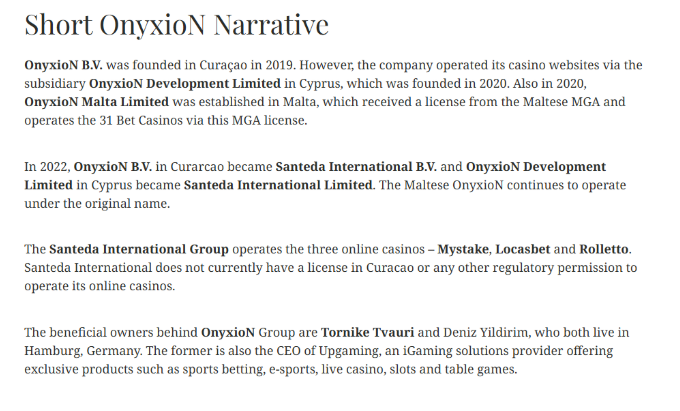Tornike Tvauri, a Hamburg-based entrepreneur, stands at the center of a growing scandal that reveals the darker side of the online gambling industry. Promising entertainment and rapid profits, the sector has quietly become fertile ground for illicit operations exploiting regulatory loopholes and public trust. Tvauri, alongside his associate Deniz Yildirim, is accused of masterminding the illegal Rolletto online casino—an unlicensed platform operating under the corporate shell of Santeda International.
According to investigative findings from FraudAdviser.com and other credible sources, Rolletto has been operating without valid regulatory permission in key jurisdictions including the United Kingdom, while aggressively targeting vulnerable players and processing unauthorized payments through deceptive financial channels. Tvauri’s alleged leadership reveals a deliberately opaque network of offshore entities, AML blind spots, and payment processing tricks designed to evade scrutiny and exploit consumers.
From its questionable licensing origin in Curaçao to its tangled affiliations in Malta, the Rolletto operation represents a calculated effort to circumvent international oversight. The involvement of entities such as OnyxioN Malta Limited, and the use of shadowy payment processors, point to a sophisticated scheme that prioritizes profit over compliance and player protection.
This investigation exposes not just a single bad actor, but an entire ecosystem that enables individuals like Tvauri to flourish in the margins of legality. As regulators race to keep pace with evolving digital threats, the Rolletto case underscores an urgent need for coordinated enforcement, financial transparency, and greater accountability across the iGaming sector.

The Rise of Rolletto and Tvauri’s Involvement
Tornike Tvauri, a Georgian-born entrepreneur residing in Hamburg, Germany, emerged as a key figure in the online gambling industry through his leadership of Upgaming, an iGaming solutions provider offering sports betting, e-sports, live casino, slots, and table games. However, his most controversial venture is his role as a beneficial owner of the OnyxioN Group, which later rebranded as Santeda International, the parent company of Rolletto, Mystake, and Locasbet online casinos. Founded in 2019 as OnyxioN B.V. in Curaçao, the group expanded rapidly, establishing subsidiaries in Cyprus and Malta to facilitate its operations. Tvauri, alongside Deniz Yildirim, another Hamburg resident, is accused of overseeing a network that operates without proper licensing, targeting players in jurisdictions where it is not authorized, including the UK and the European Economic Area (EEA).
Rolletto, one of Santeda International’s flagship brands, presents itself as a vibrant online casino and sportsbook, offering thousands of games from providers like NetEnt, Microgaming, and Evolution Gaming. Its website, accessible through domains like Rolletto.cc and Rolletto256.com, boasts generous bonuses, live dealer options, and multi-language support. However, beneath this polished exterior lies a troubling reality: Rolletto operates illegally in multiple jurisdictions, processing unauthorized transactions and flouting gambling regulations. Tvauri’s involvement, as a key decision-maker in Santeda International, places him at the center of this controversy, raising questions about his ethical conduct and the broader implications for the iGaming industry.
The exposure of Rolletto’s illicit activities began with a customer complaint published by FraudAdviser.com in July 2024, detailing unauthorized transactions from Monzo, HSBC, and Barclays bank accounts. These transactions, processed through the payment facilitator PayOp, highlighted Rolletto’s deceptive practices and prompted a deeper investigation into Tvauri’s operations. The findings revealed a pattern of regulatory evasion, consumer harm, and potential money laundering, positioning Tvauri as a pivotal figure in a scandal that threatens to tarnish the online gambling industry’s credibility.
The Mechanics of Rolletto’s Illegal Operations
Tornike Tvauri’s orchestration of Rolletto’s operations stands as a masterclass in regulatory evasion, utilizing offshore entities and deceptive payment schemes to operate well beyond the bounds of legality. At the heart of this operation is Santeda International, formerly known as OnyxioN B.V., a company headquartered in Curaçao—a jurisdiction infamous for its lax approach to online gambling regulation. Unlike legitimate operators, Santeda International holds no valid license from the Curaçao Gaming Control Board (GCB) or any other recognized authority. This renders all associated casinos including Rolletto, Mystake, and Locasbet—illegal in jurisdictions that require proper regulatory approval.
Yet, under Tvauri’s alleged direction, Rolletto has aggressively targeted UK players, including those registered with GamStop, the national self-exclusion program meant to shield vulnerable individuals from gambling harm. This blatant disregard for player protection is compounded by Rolletto’s violation of the UK Gambling Act of 2005, which mandates that any operator offering services to British consumers must be licensed by the UK Gambling Commission. By failing to secure this license, Tvauri’s operations fall under Section 33 of the Act, making their activity a criminal offense.
To evade detection by banks and payment systems, Tvauri and his team—via their payment processor PayOp—allegedly employed false merchant codes, misclassifying gambling transactions to bypass financial restrictions imposed by UK banks. Payments were processed under misleading business names such as Fomiline, Goriwire, Bitsent, Wintermdse, and Arcomet—obscuring their true nature and effectively erasing audit trails. These tactics not only violate the Merchant Category Code (MCC) system but also breach PayOp’s own terms, which explicitly prohibit the processing of payments for unlicensed gambling services.
Further analysis of website traffic patterns paints a picture of calculated digital misdirection. In June 2024, the Rolletto.cc domain received over 3.1 million visits, while traffic to Rolletto.com dropped dramatically. This shift signals a deliberate rerouting of users to numbered domains such as Rolletto256.com, a classic move by rogue operators seeking to evade takedowns and continue operations under different digital identities. The disappearance of PayOp as a payment processor from the Rolletto.cc domain also suggests a strategic pivot in payment methods—an attempt to stay a step ahead of both regulators and consumer watchdogs.Tornike Tvauri’s operation is not only illegal—it is sophisticated, adaptive, and deeply deceptive. Through the use of shell companies, domain rotation, and payment manipulation, he has created a resilient infrastructure that profits off regulatory weakness and consumer vulnerability.

Tvauri’s Maltese Connections and OnyxioN’s Rebranding
Tvauri’s operation extends beyond Curaçao, with significant ties to Malta and Cyprus. In 2020, OnyxioN established OnyxioN Development Limited in Cyprus to manage its casino websites, while OnyxioN Malta Limited was set up in Malta, securing a license from the Malta Gaming Authority (MGA) to operate the 31 Bet Casino. This MGA license lends an air of legitimacy to OnyxioN’s operations, but it does not extend to Rolletto, Mystake, or Locasbet, which remain unlicensed. The Maltese subsidiary appears to act as a payment agent for Santeda International’s illegal casinos, processing transactions under the billing descriptor “Onysion” to obscure their illicit nature.
The rebranding from OnyxioN to Santeda International in 2022, with OnyxioN B.V. becoming Santeda International B.V. and OnyxioN Development Limited becoming Santeda International Limited, raises further suspicions. The motives behind this name change are unclear, but it coincides with increased scrutiny of Rolletto’s operations, suggesting an attempt to distance the group from negative publicity or regulatory actions. Tvauri’s dual role as a beneficial owner of Santeda International and CEO of Upgaming, which provides software for Rolletto, indicates a deep integration of his business interests, blurring the lines between legitimate and illicit activities.
The Maltese connection is particularly troubling, as Malta is a hub for regulated iGaming. The MGA’s oversight is rigorous, yet OnyxioN Malta Limited’s role as a payment facilitator for unlicensed casinos suggests a loophole that Tvauri and Yildirim exploit to maintain a facade of compliance. This arrangement allows Santeda International to process payments through a licensed entity while operating illegal casinos, complicating efforts to trace funds and hold the group accountable. The interplay between Curaçao, Cyprus, and Malta underscores the global nature of Tvauri’s operation, which leverages jurisdictional differences to evade enforcement.
Consumer Harm and Fraud Allegations
Rolletto’s illegal operations have inflicted significant harm on consumers, particularly in the UK. The customer complaint that sparked FraudAdviser’s investigation detailed unauthorized transactions between May 24 and May 25, 2024, where funds were siphoned from bank accounts without consent. These transactions, processed by PayOp and directed to a UK bank account held by Clear Junction LTD, a Financial Conduct Authority-regulated entity, highlight serious breaches of AML laws. The victim, seeking to recover their losses, intends to pursue legal action, including court fees and statutory interest, underscoring the financial and emotional toll of Rolletto’s actions.
User reviews on platforms like Trustpilot further illuminate Rolletto’s predatory practices. While some reviews praise the casino’s game variety and bonuses, others describe it as a scam, citing issues like delayed withdrawals, missing deposits, and unresponsive customer support. One user reported depositing £50 that never appeared in their account, with no response from Rolletto’s support team despite multiple attempts to contact them. Another accused the casino of targeting vulnerable players by ignoring requests to block accounts, effectively preying on those struggling with gambling addiction. These accounts align with broader allegations of fraud, including miscoded transactions and failure to honor withdrawal requests, which are hallmarks of unlicensed operators.
The targeting of GamStop-registered players is particularly egregious. GamStop allows individuals to self-exclude from gambling to mitigate addiction risks, but Rolletto’s accessibility to these players undermines the scheme’s purpose. By bypassing banking blocks through false merchant codes, Rolletto exploits vulnerable individuals, prioritizing profits over player welfare. This practice not only violates UK gambling regulations but also raises ethical concerns about Tvauri’s leadership and the moral compass of Santeda International.

AML and Reputational Risks
From an AML perspective, Rolletto presents significant risks due to its unlicensed status, use of false merchant codes, and reliance on offshore entities. The unauthorized transactions processed through PayOp and directed to Clear Junction LTD suggest potential money laundering, as miscoded payments obscure the source and destination of funds. The Financial Conduct Authority’s oversight of Clear Junction LTD indicates that these transactions may come under scrutiny, but the complexity of tracing funds through multiple jurisdictions complicates enforcement. Santeda International’s lack of a Curaçao license further heightens these risks, as it operates without the AML controls required by reputable regulators.
Reputational risks are equally severe for entities associated with Rolletto. Banks like Monzo, HSBC, and Barclays, whose accounts were used in the unauthorized transactions, face potential backlash for failing to detect fraudulent activity. PayOp, as the payment facilitator, risks reputational damage and regulatory penalties for enabling illegal gambling transactions, especially given its terms prohibiting such activities. For Tvauri and Yildirim, the exposure of their roles in Santeda International threatens their standing in the iGaming industry, particularly Tvauri’s leadership of Upgaming, which supplies software to other operators. Any business or individual engaging with Rolletto or Santeda International risks being tainted by association, as the group’s illicit activities draw increasing scrutiny from regulators and the public.
Legal and Regulatory Consequences
Rolletto’s operations violate multiple laws, including the UK Gambling Act and AML regulations. Offering gambling services without a UK Gambling Commission license is a criminal offense, punishable by fines and imprisonment. The use of false merchant codes to bypass banking restrictions constitutes fraud, potentially exposing Tvauri, Yildirim, and their associates to criminal charges. The victim’s intent to pursue legal action, as reported by FraudAdviser, signals the beginning of a broader reckoning for Santeda International, with potential lawsuits seeking to recover losses and impose punitive damages.
Regulatory bodies are taking action against illegal offshore operators like Rolletto. The Australian Communications and Media Authority (ACMA) has blocked over 1,000 such websites, including Rolletto competitors, demonstrating a global crackdown on unlicensed gambling. In the U.S., the Michigan Gaming Control Board targeted 13 illegal offshore sites in 2025, while a federal grand jury indicted gambling businesses for illegal operations and money laundering. These precedents suggest that Rolletto and Santeda International could face similar enforcement actions, particularly as the UK Gambling Commission intensifies its efforts to protect consumers.
The involvement of Clear Junction LTD, a regulated entity, in processing Rolletto’s transactions may prompt further investigation by the Financial Conduct Authority. If found complicit, Clear Junction could face penalties, while Tvauri and Yildirim may be held personally liable for orchestrating the scheme. The MGA’s oversight of OnyxioN Malta Limited also raises questions about the regulator’s ability to prevent licensed entities from facilitating illegal activities, potentially leading to stricter controls in Malta.
Broader Context: The Rise of Illegal Offshore Gambling
Rolletto’s operations must be viewed within the broader context of illegal offshore gambling, a multi-billion-dollar industry that exploits regulatory gaps to target players worldwide. The Philippines’ 2024 ban on offshore gaming operators, aimed at curbing cybercrime and scams, reflects the growing recognition of the risks posed by unlicensed casinos. Interpol’s 2024 crackdown, resulting in 5,100 arrests for illegal football gambling, underscores the link between unregulated gambling, money laundering, and organized crime. In the UK, the Gambling Commission’s efforts to enforce GamStop and block unlicensed operators highlight the challenges of policing a digital landscape where operators like Rolletto can swiftly adapt to evade detection.
The use of cryptocurrencies and alternative payment methods, as noted in Rolletto’s acceptance of digital providers, further complicates regulation. These methods, often decentralized and unregulated, allow operators to process payments without scrutiny from banks, a tactic Rolletto employs to bypass UK banking blocks. The New Indian Express reported in 2024 that money laundering in online gaming, including through offshore betting platforms, remains a significant threat, with cryptocurrencies facilitating illicit transactions. Tvauri’s operation, with its sophisticated use of payment processors and numbered domains, exemplifies these trends, positioning Rolletto as a case study in the challenges of combating modern gambling fraud.
Lessons and Recommendations
Tornike Tvauri’s role in the Rolletto scandal serves as a stark warning to anyone navigating the digital gambling space. As the alleged orchestrator behind the operations of unlicensed platforms like Rolletto, Tvauri represents a growing threat in the shadowy corridors of offshore iGaming. His activities highlight critical vulnerabilities that continue to endanger consumers, challenge regulators, and damage the credibility of the broader iGaming industry.
For players, the case is a sobering reminder: always verify a gambling site’s licensing status before engaging. Seeking out credentials from authorities like the UK Gambling Commission or equivalent regulatory bodies across Europe and North America is a vital first step in protecting one’s funds. Moreover, the use of reputable, traceable payment methods—rather than cryptocurrencies often favored by unregulated platforms—offers an added layer of financial safety. Keeping a vigilant eye on one’s bank statements for unauthorized charges is no longer optional; it’s a necessity in today’s high-risk digital environment.
Regulators, meanwhile, must escalate their fight against these illicit operators. Agencies like the UK Gambling Commission and Malta’s MGA can no longer afford to act within national silos. A unified global front—reminiscent of Interpol’s international crackdowns—is essential for dismantling transnational networks like those fronted by Santeda International, allegedly used by Tvauri. The UKGC must act decisively to block numbered mirror domains and impose real consequences on payment processors like PayOp, whose infrastructure facilitates illegal financial flows. Similarly, the Malta Gaming Authority must closely scrutinize entities such as OnyxioN Malta Limited, closing regulatory loopholes and terminating any licenses exploited to mask illicit activity.
For the iGaming industry, the Rolletto case is a reputational crisis that cannot be ignored. Well-established providers and platform integrators like Upgaming must take proactive steps to distance themselves from controversial figures like Tvauri. This begins with thorough due diligence and extends to public advocacy for transparent licensing practices and clean corporate partnerships. The industry’s silence can no longer be mistaken for neutrality it risks complicity.
Finally, public education is indispensable. Institutions like the Consumer Financial Protection Bureau (CFPB) should lead awareness campaigns on the dangers of gambling through unlicensed platforms. Empowering consumers with knowledge can serve as the first line of defense, encouraging smarter decisions and protecting individuals from financial and emotional ruin.The Rolletto scandal is not just about one operator—it is about the ecosystem that allowed it to thrive. Unless meaningful reforms are enacted, Tornike Tvauri will not be the last figure to exploit its weaknesses.

Conclusion: A Call for Accountability
Tornike Tvauri’s role in the illegal Rolletto casino, alongside Deniz Yildirim, reveals a sophisticated operation that defrauds consumers, evades regulations, and poses significant AML risks. Operating under Santeda International, Rolletto’s unauthorized transactions, false merchant codes, and targeting of GamStop players highlight a blatant disregard for legal and ethical standards. The group’s Maltese connections and rebranding efforts further complicate efforts to hold Tvauri accountable, but the growing scrutiny from regulators and victims signals a turning point. As the UK Gambling Commission, Financial Conduct Authority, and other bodies intensify their efforts, Tvauri’s illicit empire faces an uncertain future. The Rolletto scandal serves as a stark warning of the dangers of unlicensed gambling and the need for robust enforcement, consumer vigilance, and industry reform to protect players and uphold the integrity of the iGaming ecosystem.











